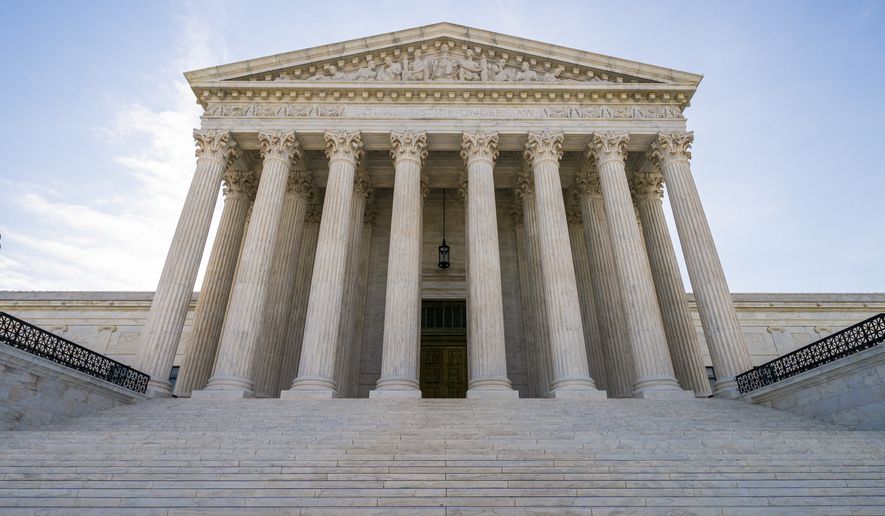Religious school associations and Republican members of Congress are marshaling support for an April showdown in the Supreme Court over the “ministerial exception,” under which private schools invoke their religious status when faced with wrongful termination lawsuits by staff.
The upcoming court case consolidates two lawsuits — Our Lady of Guadalupe School v. Agnes Morrissey-Berru and St. James School v. Darryl Biel. In those lawsuits, two lay teachers at Catholic grade schools in California accuse their employers of wrongful termination after the schools declined to extend the teachers’ contracts, citing a court-crafted “ministerial exception.”
The plaintiffs argue that they were teachers, not ministers of the Roman Catholic faith.
“They [the educators] teach daily religion classes, they lead students daily in prayer, they’re really the primary means by which the Catholic church teaches the faith to the next generation,” said Luke Goodrich, vice president and senior counsel with Becket Fund for Religious Liberty, the law firm defending the Catholic schools. “They [students] get more religion from these teachers than the parish priest.”
The case will turn on who is considered a “minister” under federal employment law.
In 2012, the Supreme Court upheld a Missouri Lutheran school’s termination of a narcoleptic religious education teacher who had been required to lead students in daily prayer and devotional exercises, saying a ministerial exception applied to civil rights and employment laws under the First Amendment.
In Hosanna-Tabor Evangelical Lutheran Church and School v. EEOC, the plaintiff was a “called” teacher, or a minister of the church.
But in the upcoming case — set for oral arguments on April 1 — the two teachers mostly provided secular education, save for a few hours each week of religious instruction.
“There is, to be sure, no singular definition for ’minister,’” says a friend-of-the-court brief published Monday and signed by several congressional Republicans, including Sen. James Lankford of Oklahoma and Rep. Steve King of Iowa. “Yet whether in the pulpit or in the classroom, at the heart of ministry for many religions is teaching the faith.”
Attorneys for the Alliance Defending Freedom filed a friend-of-the-court brief on behalf of the Association of Classical Christian Schools the Cardinal Newman Society, William Jessup University and the Association for Biblical Higher Education. It calls for a three-pronged test for future courts to decide whether an employee qualifies as a minister, with heavy deference to the employer’s religious preferences. The brief says the “test is not intended to classify every employee of a religious organization as a ’minister.’”
In one of the lawsuits, teacher Agnes Morrissey-Berru, 64, sued Our Lady of Guadalupe School in the Los Angeles area in 2016 after losing her job, citing age discrimination. She is *Catholic but had not been hired on the basis of any religious training. Administrators, however, claimed immunity from the lawsuit under the ministerial exception.
“[T]he school neither required its teachers to be Catholic, nor required them to have any training, experience, or education in religion or in teaching the Catholic faith,” attorneys for Ms. Morrissey-Berru said in a court filing last fall.
In the other lawsuit, St. James School in Torrance, California, did not renew fifth-grade teacher Kristen Biel’s contract in 2014 while she was being treated for breast cancer. After Biel died, her widower, Darryl Biel, carried on the lawsuit, saying his wife’s employer violated the Americans with Disabilities Act.
In a 2-1 decision in favor of Mr. Biel in 2018, a three-judge panel of the U.S. Court of Appeals for the 9th Circuit noted that while the First Amendment contains a ministerial exception, “it does not provide carte blanche to disregard antidiscrimination laws when it comes to other employees who do not serve a leadership role in the faith.”
Mr. Goodrich said the 9th Circuit misapplied the lessons of the 2012 Supreme Court case. He said that simply “because somebody is labeled a particular title,” such as custodian or math teacher, shouldn’t necessarily mean they can’t conduct ministerial duties.
“There will always be borderline questions,” he said.
* (Correction: An updated version of the story has been fixed to reflect that Agnes Morrissey-Berru is Catholic.)
• Christopher Vondracek can be reached at cvondracek@washingtontimes.com.




Please read our comment policy before commenting.